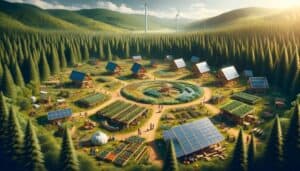Embarking on an off-grid adventure is akin to stepping into a pair of overalls that are two sizes too small – it’s uncomfortable, a bit awkward, and you’re constantly wondering whether you’ve made a tremendous fashion faux pas. Yet, the allure of living a life untethered to the grid, much like the siren call of those ill-fitting overalls, is hard to resist. It promises freedom, sustainability, and the opportunity to use the phrase “I live off the grid” at dinner parties, instantly boosting your street cred.
However, transitioning to an off-grid lifestyle can be fraught with pitfalls that are as amusing as they are challenging. The road less traveled is littered with the dreams of those who thought they could simply “wing it.” Let’s explore these pitfalls, shall we?
First up, water – the essence of life, the liquid that fuels our very existence, and the thing most first-time off-gridders forget they can’t just summon by turning a tap. The realization that water doesn’t magically appear, but must be sourced, stored, and sometimes even begged for, can hit harder than a teenager’s first breakup. Ensuring a reliable water source is crucial unless you’re particularly fond of the “eau de unwashed” aroma.
Then there’s the issue of power, which many approach with a “how hard can it be?” attitude, only to find that sizing a solar or wind system isn’t quite as simple as choosing the right Instagram filter. Underestimating energy needs can lead to a lifestyle that’s more “candle-lit dinner” and less “Netflix and chill,” unless by “chill” you mean literally shivering in the dark.

Food security is another overlooked aspect. Many a greenhorn has ventured into off-grid living with visions of thriving vegetable gardens and flourishing chicken coops, only to end up with a sad patch of dirt and a fox who’s mysteriously well-fed. Sustainable food sources require planning, patience, and a willingness to engage in mortal combat with wildlife over the last tomato.
Waste management, or the “what goes in must come out” principle, is often ignored until it becomes glaringly, and olfactorily, obvious. Composting toilets and waste disposal systems become subjects of fascination, as the alternative is… well, let’s just say it’s not conducive to hosting dinner parties, no matter how off-grid chic you are.
Underestimating costs can also catch many by surprise. The fantasy of living free from utility bills is quickly shattered by the reality of the upfront and ongoing expenses of off-grid equipment. It’s like expecting a cheap night out, only to find you’ve wandered into the most expensive bar in the city and you’re already ordering the third round.
Local laws and zoning regulations are the buzzkill at the off-grid party. Many an enthusiastic settler has been thwarted by the fine print, discovering that their dream of building a cob house is actually illegal in their chosen paradise. It’s the equivalent of planning an epic road trip, only to realize your car isn’t street legal.
Choosing the wrong location can be as disastrous as wearing socks with sandals. Factors like climate, soil quality, and access to resources play a pivotal role in off-grid success. Ignoring these can result in a living situation that’s less “back to nature” and more “nature’s revenge.”
The lack of community is often felt acutely by off-grid novices. Isolation can be tough, and without a network of like-minded individuals, it’s easy to feel as though you’re starring in your own survivalist reality show – minus the camera crew and emergency medical team.
Inadequate skills and knowledge can turn the off-grid dream into a comedy of errors. There’s a fine line between “rustic living” and “how did I accidentally build a catapult while trying to install solar panels?” Education and preparation are key unless you’re aiming for viral fame as the person who mistook a beehive for an organic shower option.
Not planning for emergencies is akin to going on a road trip without a spare tire or map. Off-grid living requires a robust plan for dealing with medical issues, natural disasters, and the inevitable zombie apocalypse (or, more realistically, power outages).
Lastly, the reliance on technology can be a double-edged sword. While gadgets and gizmos can make off-grid living more manageable, they’re no substitute for good old-fashioned know-how. When the solar-powered WiFi router fails, you can’t just Google “how to fix solar-powered WiFi router without internet.”
Solutions for the Aspiring Off-Gridder
Fear not, for every pitfall there is a ladder (or at least a slightly unstable step stool). The key to successful off-grid living lies in preparation, education, and a healthy dose of humor.
- Water Wisdom: Secure multiple water sources and learn the art of rainwater harvesting. Remember, the only thing worse than too little water is explaining to guests why they can’t flush the toilet.
- Power Play: Because being able to charge your phone to call for help when you accidentally build a catapult instead of a greenhouse is always a good idea.
- Feeding Frenzy: Start small with your food production dreams. Begin with a modest garden and perhaps a few chickens or rabbits. Remember, Rome wasn’t built in a day, and neither was the off-grid farm that didn’t lead to a dietary plan consisting exclusively of canned beans and regret.
- Waste Not, Want Not: Embrace the beauty of composting and the joys of sustainable waste management. There’s something deeply satisfying about turning yesterday’s meals into tomorrow’s tomatoes, or so I’ve been told by people who manage to do it without attracting a small army of raccoons.
- Counting Costs: Budget for the unexpected because off-grid living has more hidden fees than a budget airline. A “rainy day fund” is essential, and not just because your solar panels don’t work as well under cloud cover.
- Law and Order: Do your homework on local regulations before you commit to a location. It’s less exciting than planning where to put your eco-friendly hot tub, but it’s also less exciting than a cease and desist order from your local government.
- Location, Location, Location: Choose your land wisely. Look for a place that supports your lifestyle and goals. And remember, just because the land is cheap doesn’t mean it’s a good deal. There’s a fine line between “secluded paradise” and “that place where the GPS loses signal and you’re pretty sure you heard banjo music.”
- Community Spirit: Find your tribe. Whether it’s a local group of like-minded folks or an online community, having support can make all the difference between thriving and barely surviving. Plus, it’s always handy to have someone to borrow a cup of sugar from, or in this case, a manual grain mill.
- Skill Up: Learn everything you can before you make the leap. From basic carpentry to advanced gardening techniques, the more you know, the less likely you are to end up using your emergency flares as a makeshift disco light because you got bored.
- Emergency Prep: Have a plan for when things go south. Whether it’s a medical kit, backup generators, or a stash of essentials, being prepared can turn a potential disaster into just another adventure.
- Tech Balance: Use technology wisely. It’s a tool, not a crutch. Remember, the pioneers made it without YouTube tutorials, but they also had a life expectancy of 40. Aim for a happy medium.
Concluding Solutions with a Dash of Humor
In conclusion, off-grid living is not for the faint of heart, but with preparation, patience, and a good sense of humor, it’s an incredibly rewarding journey. It’s about embracing the chaos, learning from the land, and occasionally laughing at yourself when you realize you’ve been talking to your plants more than actual people.
Remember, every mistake is a lesson, every challenge is an opportunity, and every time you have to run your generator because it’s been cloudy for a week, it’s a chance to practice your stand-up comedy routine about the joys of off-grid living. With the right mindset and preparation, you’ll not only survive off the grid, but thrive, proving once and for all that living without Netflix isn’t the end of the world – as long as you’ve got a good book and a decent view of the stars.


